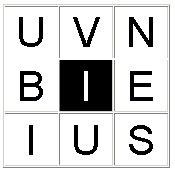Thursday, December 02, 2010
certamen
Here's a bit of a competition for the weekend - what's going on in the above picture? A bit of background: it's a photo of a mosaic I saw recently at the Getty Roman Villa in Los Angeles. I was quite excited when I saw it as I immediately recognised it as one of my favourite moments from the Aeneid. If you think you know what it is leave me a comment. If you've got no idea what it might be feel free to use your imagination. Perhaps you could even write a humorous caption.
Wednesday, July 21, 2010
Monster Puzzle
If a Mermaid is a Woman plus a Fish (M = W + F) which mythological creatures are represented by the following equations?
C = M + H
M = M + B
S = W + L
G = E + L
F = M + G
H = W + B
C = R + S
C = L + G + S
M = M + L + D
A site like theoi or even this previous post might help you find some of the answers (or then again, they might not). I'll post the answers in the comments in a few days time. Bonus points if you can also identify the mythological creature in the picture at the top of this post.
Wednesday, March 31, 2010
Trivia
The after-dinner trivia was slightly easier than in previous years, but there were still a few questions which left me scratching my head. See if you can work out the answers to these beauties.
Which Sydney suburbs are referred to below?
- terra australis
- ager cinis
- urbs cornus
- oppidum novum
- herbaria
- virilis
- collis aestivus
- tumuli septem
- filix rubra
- vallis viridis
Which sporting teams are referred to below?
What was the nationality of the following people?
- Ulysses
- Hannibal
- Romulus and Remus
- Cleopatra
- Vercingetorix
- Boudicca
Tuesday, August 05, 2008
word ladders
Here are a couple of Latin word ladders (scala verborum?) I made for my year nine class, see if you can work them out.
- canis to lupus in five steps
- nox to die in five steps
10 points for the first correct solutions!
[N.B. Apparently for proper word ladders jumbling letters or adding/subtracting a letter can count as a step, but for these ones it's not necessary.]
Related Posts
Friday, April 04, 2008
Senior Classics Dinner

- stethoscope
- microphone
- camera
- seismograph
- television
- hypodermic
- Crinaeae
- Limnades (or Limnatides)
- Pegaeae
- Potameides
- Eleionomae
- Quinquatria (in honour of Minerva)
- Robigalia (in honour of Robigus)
- Vestalia (in honour of Vesta)
- Ieiunium Cereris (Fast of Ceres)
- Dies Natalis Invicti Solis (Festival of the Invincible Sun god)
Thursday, February 14, 2008
Tuesday, November 13, 2007
Roman Wordplay
Wordplay is about as old as language itself, and about as various. As Tony Augarde notes... many verbal pastimes go back to the futhest reaches of antiquity. Palindromes, sentences that read the same backwards as forwards, are at least 2,000 years old. The ancient Greeks often put 'nipson anomimata mi monan opsin' on fountains. It translates as 'Wash the sin as well as the face'.' The Romans admired them too, as demonstrated by 'in girum imus noctem et consumimur igni' ('We enter the circle after dark and are consumed by fire'), which was said to describe the actions of moths. The Romans also liked anagrams- scrambling the letters of a word or phrase to form new words or phrases- and turned 'quid est veritas?' ('What is truth?') into 'est vir qui adest' ('It is this man here?').(Bill Bryson, Mother Tongue, p 224)
Wednesday, September 05, 2007
Aeolus
In the opening lines of the Aeneid, Juno comes to Aeolus and asks him to set free his winds, in order to create a storm which will sink the Trojans' ships.
Here Aeolus is king and here in a vast cavern he keeps in subjection the brawling winds and howling storms, chained and bridled in their prison. They murmur in loud protest round bolted gates in the mountainside while Aeolus sits in his high citadel, holding his sceptre, soothing their spirits and tempering their angry passions. But for him they would catch up the sea, the earth and the deeps of the sky and sweep them along through space. In fear of this, the all powerful father banished them to these black caverns with massive mountains heaped over them, and gave them a fixed charter, a king who knew how to hold them in check or, when ordered, to let them run with free rein...
To Juno's request, Aeolus answers, "Your task, O queen, is to decide your wishes; my duty is to carry out your orders. It is thanks to you that I rule this little kingdom and enjoy this sceptre and the blessing of Jupiter. Through you I have a couch to lie on at the feasts of the gods, and my power over cloud and storm comes from you.'
At these words he struck the side of the hollow mountain with the butt of his spear and the winds seemed to form a column and pour out through an open gate to blow a hurricane over the whole earth. The east wind and the south and the south-west with its squalls all fell upon the sea at once, whipping it up from its bottom-most depths and rolling huge waves towards its shores. Men shouted, ropes screamed, clouds suddenly blotted out the light of the sky from the eyes of the Trojans and black night brooded ove the sea as the heavens thundered and lightning flashed again and again across the sky.
Thursday, May 03, 2007
appropinquaveramus
amare (to love), amor (love), anus (old woman), appropinquare (to approach), aqua (water), arena (arena), avarus (miser), avus (grandfather), eram (I was), mane (in the morning), mansi (I waited), manus (hand), mare (sea), Mars (god of war), Minerva (goddess of wisdom), pareo (I obey), paro (I prepare), pars (some), parvus (small), pavo (peacock), pons (bridge), primus (first), prius (beforehand), prope (near), prora (prow), puer (boy), quae (which), quam (how, than), quis (who), reparo (I repair), servum (slave), verus (true), viae (streets), quippe (of course), quia (because), sero (late), sequor (I follow), sive (or if), sine (without), suis (her own), viro (man), vires (strength), vinum (wine)
[in case you didn't know appropinquaveramus itself means 'we had approached']
Tuesday, February 20, 2007
fyi
can you work out what the following English words mean, and from what Latin words they are derived.
[5 points for each correct answer]
- crucify
- deify
- mollify
- nullify
- pacify
- petrify
- rectify
- sanctify
- stultify
- vitrify
[For a longer list of words ending in -fy see here]
Wednesday, January 17, 2007
Target #2

This Target: 6 words, good; 12 words, very good; 18 words, excellent
Solving the Target Puzzles
See how many Latin words of two letters or more you can make from the letters shown in the above grid.
In making a word, each letter must be used once only.
Each word must contain the centre letter and there must be at least one nine-letter word in the list.
You may include words of any case, number, tense, mood, voice or person, but only one form of each word.
Wednesday, December 13, 2006
Which Roman Goddess Are You?
 i. What’s your favourite animal?
i. What’s your favourite animal?(a) peacock
(b) dove
(c) owl
(d) deer
ii. What’s your favourite tree?
(a) pomegranate
(b) myrtle
(c) olive
(d) cypress
iii. Where would you most like to go on holidays?
(a) Carthage, in Africa
(b) Cyprus, in Greece
(c) Athens, in Greece
(d) Ephesus, in Turkey
iv. What’s your ideal way to spend a Saturday night?
(a) tormenting my step-children
(b) spending some quality time with my boyfriend
(c) staying at home, doing some weaving or sewing
(d) running through the woods with my hunting dogs
v. Your friends say you are:
(a) strong and powerful
(b) beautiful and sensitive
(c) beautiful and serious
(d) fun-loving and adventurous
vi. Tell me about your parents:
(a) My father Cronos, swallowed me when I was born, but my brother gave him poison to make him vomit me back up
(b) I was born from the waves which washed around the severed limbs of Uranus
(c) I was born, fully grown, from the head of my father Jupiter, who had swallowed my mother
(d) I am the daughter of Jupiter and Latona, born on the sacred Island of Delos
vii. You’ve been offended by a pesky mortal. How do you take revenge?
(a) send a huge storm to shipwreck him at sea
(b) make her fall in love with the ugliest man alive
(c) turn her into a spider
(d) turn him into a deer, and make his own hunting dogs tear him to pieces
[to find out which Roman goddess you are see comments]
[for a similar (but better) quiz visit this site]
Monday, December 04, 2006
Target

Solving the Target Puzzles
See how many Latin words of two letters or more you can make from the letters shown in the above grid.
In making a word, each letter must be used once only.
Each word must contain the centre letter and there must be at least one nine-letter word in the list.
You may include words of any case, number, tense, mood, voice or person, but only one form of each word.
[I managed to make about 30 words, though that is by no means definitive. I'll put up my list in a couple of days, if anyone's interested]
Monday, August 21, 2006
Monday, period 4
Thursday, July 27, 2006
fabulae
Ovis, canis et lupus
Solent mendaces luere poenas malefici.
Calumniator ab ove cum peteret canis,
quem commendasse panem se contenderet,
lupus, citatus testis, non unum modo
deberi dixit, verum adfirmavit decem.
Ovis, damnata falso testimonio,
quod non debebat, solvit. Post paucos dies
ovis iacentem in fovea conspexit lupum.
‘Haec’ inquit ‘merces fraudis a superis datur’.
________ are accustomed to pay the penalties for their crimes. When the perjurious ________ asked the sheep to return to him the loaf of bread, which he had lent her, a ________, having been summoned as a ________, said that he was owed not only ________, but claimed that it was ________. The ________, condemned by this ________ testimony, paid back that which she did not owe. After a few ________, the ________ saw the ________ lying dead in a ditch. ‘This reward’ she said ‘is given to tricksters by the gods’.
Leo senex, aper, taurus et asinus
Quicumque amisit dignitatem pristinam,
ignavis etiam iocus est in casu gravi.
Defectus annis et desertus viribus
leo cum iaceret spiritum extremum trahens,
aper fulmineis spumans venit dentibus,
et vindicavit ictu veterem iniuriam.
Infestis taurus mox confodit cornibus
hostile corpus. Asinus, ut vidit ferum
impune laedi, calcibus frontem extudit.
At leo exspirans 'Fortis indigne tuli
mihi insultare: sed te, Naturae dedecus,
quod ferre certe cogor bis videor mori'.
Whoever has lost his original ________ becomes a ________ and a ________, when in serious misfortune. When a ________, failing in ________ and ________ by his strength, was lying, drawing his final ________, a boar, foaming at the mouth, with his teeth shining, ________ and repaid an old ________ with a blow. Soon a troublesome ________ pierced his hostile ________ with his horns. A donkey, when he saw the beast suffering without retaliating, struck him on the forehead with his hooves. But, as he died, the ________ said “I bore it bravely when the brave insulted me: but because I am forced to bear it from you too, Nature’s shame, I seem to die twice.”
For more of Phaedrus' fables and translations click here.



